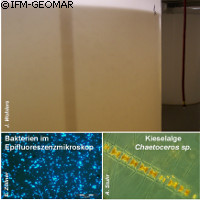Study shows how marine microorganisms affect ocean warming
The Earth's climate system is affected by the world's oceans which have contributed to climate change deceleration by absorbing up to 33% of the human-generated greenhouse gas emissions. But a team of marine researchers from Germany has shed light on how biological factors could also play a role in this process. The results were recently published in the journal PNAS. The researchers from Germany's Leibniz Institute of Marine Sciences at the University of Kiel (IFM-GEOMAR), the Alfred Wegener Institute for Polar and Marine Research, and the Leibniz Institute for Baltic Sea Research showed in an experiment with natural plankton communities that biology plays a key role. The ocean takes up atmospheric carbon dioxide (CO2) at the sea surface. According to the researchers, the continued absorption of this CO2 is possible when it is transported to deeper layers. 'One of the mechanisms responsible for this transport to depth is the biological carbon pump,' said lead author Julia Wohlers, a PhD student in Biological Oceanography from IFM-GEOMAR. This carbon pump 'transports surface-bound organic carbon to the deep ocean and hence contributes to the ocean's capacity to take up atmospheric CO2', she added. Planktonic algae develop biomass by using CO2 and nutrients when light conditions improve and temperatures increase in the spring, they explained. Once the algae die, some of the generated biomass drops to lower levels in the ocean, in turn carrying with it photosynthetically bound carbon. The research team set up 8 mesocosms (i.e. miniature ecosystems) with a volume of 1,400 litres each to assess the impact of rising sea surface temperature on the cycling and fate of organic carbon during a phytoplankton spring bloom. There were four temperature-controlled climate chambers and the tanks were filled with unfiltered seawater from Kiel Fjord which contains a natural winter/spring plankton community. Each mesocosm, and in particular the build-up and decline of the spring plankton bloom, were monitored for one month. The researchers said the varied temperatures corresponded to the warming scenarios forecast by the Intergovernmental Panel of Climate Change (IPCC) until the end of the 21st century. Based on the IPCC projections, the temperatures could rise by up to 6° Celsius by 2100. 'As expected, the metabolic rates of all components of the plankton community were accelerated with increasing temperature,' explained project leader Professor Ulf Riebesell from IFM-GEOMAR. 'What came as a surprise to us was that the plankton consumed up to one third less CO2 at elevated temperatures. Ultimately, this may cause a weakening of the biological carbon pump.' The research indicated that the carbon pump weakened when the photosynthetic build-up of biomass by the planktonic algae reacted slightly to warming and its consumption by bacteria grew considerably with higher temperatures. In a nutshell, more CO2 is retained in the surface layer, which will in turn absorb less CO2 from the atmosphere. 'This study underscores the importance to improve the incorporation of biological processes and feedbacks in Earth system models,' Ms Wohlers remarked. She noted, however, that more research should be conducted to determine the magnitude of the observed feedback on a global scale. 'Data in this research area are still sparse and further research efforts are needed to fill this gap of knowledge.'
Countries
Germany



